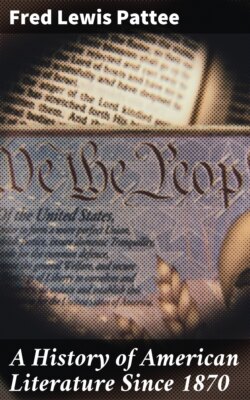Читать книгу A History of American Literature Since 1870 - Fred Lewis Pattee - Страница 15
На сайте Литреса книга снята с продажи.
III
ОглавлениеTable of Contents
For the new humor, which was to be the first product of the new period in American literature, was Western humor of the "John Phœnix" type. It came from three great seed places: the Mississippi and its rivers, the California coast, and, later, the camps of the Civil War. It was the humor of the gatherings of men under primitive conditions. It was often crude and coarse. It was elemental and boisterous and often profane. To the older school of poets and scholars in the East it seemed, as it began to fill all the papers and creep even into the standard magazines, like a veritable renaissance of vulgarity. "The worlds before and after the Deluge were not more different than our republics of letters before and after the war,"[17] wrote Stedman to William Winter in 1873, and the same year he wrote to Taylor in Europe, "The whole country, owing to contagion of our American newspaper 'exchange' system, is flooded, deluged, swamped, beneath a muddy tide of slang, vulgarity, inartistic bathers [sic], impertinence, and buffoonery that is not wit."[18]
Many of the new humorists had been born in the East, but all of them had been drilled either in the rough school of the West or in the armies during the war. Shaw had been a deckhand on an Ohio River steamer; Browne had been a tramp printer both in the East and the West, and had lived for a time in California; Clemens had been tramp printer, pilot on the Mississippi, and for five years miner and newspaper man on the Western coast; Webb and Nye and Newell had seen life in California; Locke had edited country papers in northern Ohio, and C. H. Smith, Landon, Bailey, Sweet, Lewis, and Burdette had been soldiers in the Civil War. All of them had been thrown together with men under circumstances that had stripped them and the life about them of all the veneer of convention and class distinction.
One thing the group had in common: they were newspaper men; most of them had worked at the case; all of them at one time or another were connected with the press. The new humor was scattered by the newspapers that after the war spread themselves in incredible numbers over America. The exchange system, complained of by Stedman, became nation wide. The good things of one paper were seized upon by the others and sown broadcast. Humorous departments became more and more common, until staid old papers like the Boston Advertiser had yielded to the popular demand. The alarm voiced by Stedman in his letter to Taylor was taken up by the more conservative magazines. The humor of to-day is written for the multitude, complained the ponderous old North American Review, "that uncounted host which reads for its romance The Ledger and The Pirate of the Gulf. Common schools make us a nation of readers. But common schools, alas! do little to inculcate taste or discrimination in the choice of reading. The mass of the community has a coarse digestion. … It likes horse-laughs."[19] But it is useless to combat the spirit of the age.
The wave rolled on until it reached its height in the mid seventies. From journals with an incidental humorous column there had arisen the newspaper that was quoted everywhere and enormously subscribed for solely because of the funny man in charge. The Danbury News, the local paper of a small Connecticut city, swelled its subscription list to 40,000 because of its editor Bailey. The vogue of such a paper was not long. At different periods there arose and flourished and declined "Nasby's" Toledo Blade, "Lickshingle's" Oil City Derrick, Burdette's Burlington Hawkeye, "M. Quad's" Detroit Free Press, Peck's Sun, Sweet's Texas Siftings, Read's Arkansaw Traveller, and many others.
The greater part of this newspaper humor was as fleeting as the flying leaves upon which it was printed. It has disappeared never to be regathered. Even the small proportion of it that was put by its authors into book form has fared little better. From all the host of literary comedians that so shook the period with laughter not over four have taken anything even approaching a permanent place. These four are Browne, Locke, Nast, and Shaw.
